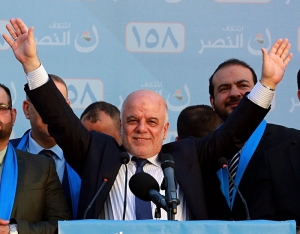BAGHDAD (AP) — Low turnout and voting irregularities marked the initial hours of voting Saturday in Iraq’s first elections since the country declared victory over the Islamic State group.
Voting began early Saturday morning in a contest that has no clear front-runner after weeks of official campaigning. Iraqi Prime Minister Haider al-Abadi is facing stiff competition from political parties with closer ties to Iran.
After hours of reports of low turnout in Baghdad, al-Abadi partially lifted a security curfew banning most civilian vehicles from the streets of the Iraqi capital in an effort to improve turnout.
The curfew had been in place since midnight the night before and many voters complained of having to walk more than 4 kilometers (2.5 miles) to reach polling stations.
Iraq’s most senior Shiite cleric spoke out on the issue of voter participation Saturday afternoon, encouraging Iraqis to vote “to prevent the arrival of a corrupt parliament.”
“The lack of participation will give the opportunity for others to reach parliament and they will be very far from the aspirations of the people,” said Sheikh Abdul-Mahdi al-Karbalai, the representative of Grand Ayatollah Ali al-Sistani, on local Iraqi television from Karbala. Sistani has repeatedly encouraged Iraqis to vote into power Saturday a new political class to combat corruption.
For those who did attempt to vote, some in Baghdad complained of voting irregularities at polling stations linked to a new electronic voting system implemented for the first time this year in an effort to reduce fraud.
Thamer Aref, 45, along with his wife and daughter were turned away from a polling station north of central Baghdad.
Aref had turned in his old voter ID card months ago for the biometric identification card required by the new system. However, Aref’s biometric card wasn’t ready ahead of Saturday and, with neither card, the polling station did not allow him to a cast a ballot.
“I lost my right to vote,” he said.
Associated Press journalists documented several similar cases at a number of different polling stations across Baghdad Saturday morning.
Amira Muhammed, the supervisor of a polling station in Azamiyah, Baghdad, said some people couldn’t vote because they did not pick up their new biometric ID cards in time.
“The problem is not with us,” she said.
In central Baghdad, voters supporting al-Abadi said they are doing so because they give him credit for Iraq’s military victory over IS.
Al-Abadi “took revenge” for civilians killed in insurgent attacks in Iraq “with the victory over Daesh,” said 71-year-old Felihah Hassan, using the Arabic acronym for IS.
After IS overran nearly a third of Iraq in the summer of 2014, the group launched waves of suicide bombings targeting civilians in Baghdad and other pockets of government-controlled territory.
With support from the U.S.-led coalition and Iran, al-Abadi oversaw a grueling war against the extremists and declared victory over the group in December.
Despite al-Abadi’s military achievements, Iraq continues to struggle with an economic downturn sparked in part by a drop in global oil prices, entrenched corruption and years of political gridlock.
The prime minister’s most powerful opponents are his predecessor, Nouri al-Maliki, and an alliance of candidates with close ties to the country’s powerful, mostly Shiite paramilitary forces.
Jassim Mohsen, 58, who fought against IS with the paramilitary forces, said he’s casting his vote for the alliance with paramilitary ties because of their personal sacrifices.
“I elected the Fatah list because they are the only ones who fought Daesh and gave blood,” he said.
Some Sunnis voting Saturday said they are hopeful this election will help Iraq move beyond sectarian politics and become more inclusive.
Marginalization of Iraq’s Sunnis under al-Maliki is seen as a factor that allowed IS to rise in power in Iraq. Al-Abadi has led a more cross-sectarian government marked by his ability to balance the interests of his two allies often at odds: the U.S. and Iran.
The war left more than 2 million Iraqis, mostly Sunnis, displaced from their homes, with cities, towns and villages suffering heavy destruction. Repairing infrastructure across Anbar and Nineveh provinces, both majority Sunni areas, will cost tens of billions of dollars.
Abdulrazaq Kubi and his wife Suheila Mahdi, both Sunnis from Baghdad, said they would not be voting for al-Abadi, casting their votes instead for a Sunni-led political alliance.
“The victory is not 100 percent, there is still Daesh here,” said Mahdi. The government “is neglecting the refugees because they are Sunni. They left them in the camps, in the winter it floods, in the summers, they go hungry,” she added.
In total there are 329 parliament seats at stake, with nearly 7,000 candidates from dozens of political alliances.
The results of Saturday’s election are expected within 48 hours of the vote, according to the independent body overseeing the election.
Government formation negotiations are expected to drag on for months following that as the dozens of political parties attempt to cobble together a political bloc large enough to hold a majority of seats in parliament.
AP

